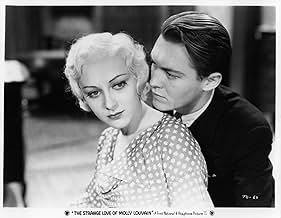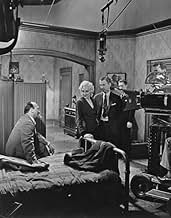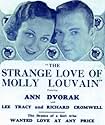Füge eine Handlung in deiner Sprache hinzuMolly Louvain's plans for a respectable marriage with her sweetheart Ralph fall through so she takes to the road with a two-bit crook and becomes wanted by the police in connection with a hi... Alles lesenMolly Louvain's plans for a respectable marriage with her sweetheart Ralph fall through so she takes to the road with a two-bit crook and becomes wanted by the police in connection with a high-profile crime.Molly Louvain's plans for a respectable marriage with her sweetheart Ralph fall through so she takes to the road with a two-bit crook and becomes wanted by the police in connection with a high-profile crime.
- Regie
- Drehbuch
- Hauptbesetzung
- Auszeichnungen
- 3 wins total
Thomas E. Jackson
- Police Sergeant
- (as Thomas Jackson)
Ben Alexander
- Jimmy's College Friend
- (Nicht genannt)
Louise Beavers
- Washroom Attendant
- (Nicht genannt)
Harry Beresford
- Taxi Driver
- (Nicht genannt)
Maurice Black
- Nicky's Pal
- (Nicht genannt)
Wade Boteler
- Detective
- (Nicht genannt)
William Burress
- Policeman
- (Nicht genannt)
George Chandler
- Reporter
- (Nicht genannt)
Empfohlene Bewertungen
Molly Louvain (Ann Dvorak) is knocked up and abandoned by a rich guy. So she takes up with a dirty crook (Leslie Fenton), then a naive bellhop (Richard Cromwell), and finally a cynical reporter (Lee Tracy). She's the Goldilocks of love. Fun Pre-Coder from WB is a nice showcase for lovely Dvorak, one of classic Hollywood's most under-appreciated talents. She dyes her hair blonde in this. Gotta say she looked better as a brunette. This is also the movie she met her first husband Leslie Fenton. The two married not long after this was released. Lee Tracy doesn't show up until a half hour or so into the picture but things pick up once he does. His scenes with Dvorak are filled with snappy banter and excellent chemistry. The movie really takes off when these two are together.
Curtiz' slick, odd, interesting little flick. Ann Dvorak is a small-town go-getter. Her boyfriend deserts her. She hooks up with a worthless, hustling traveling salesman and has a daughter by the boyfriend who dropped her. She tries to drop the salesman and gets involved in a murder imbroglio, but gets off with the help of fast-talking newspaper reporter Lee Tracy. Fast paced and acted in Warner's best style
Fast little Warners item, from a play by Maurine Watkins--who wrote the source material for "Chicago," and this hard-boiled B is very much cut from the same cloth, with big-city corruption, tough-talking dames, and vice not always unrewarded. Ann Dvorak, always good in this sort of part, is the girl from the wrong side of the tracks whose attempts to crash high society are thwarted, and ends up a fugitive, for reasons she's not quite guilty and not quite innocent of. She's also an unwed mom, and not entirely an unsympathetic one, this being a year before they started fully enforcing the Production Code. Lee Tracy plays, as he was born to play, a fast-talking, fast-thinking newspaperman, and watching him at his peak is sort of like watching Cagney--he's so lively he's impossible not to like, even playing a reprobate like this. The story doesn't quite hang together: If Molly was really abandoned by her mom at seven, as she states early on, she's only 16 at the start of the film, which makes no sense at all. And while nobody, not even Tracy, is able to recognize the peroxide version of Molly as the same on-the-lam gal in the picture they have of her, her infant daughter does, at once. The tone's uneven, too, veering between melodrama and uneasy comedy. But Dvorak and Tracy are so watchable, and the supporting cast (Richard Cromwell, Guy Kibbee, Frank McHugh) so quintessential early-'30s Warners, it's a fine time-waster.
Molly Louvain is a girl who has become pregnant by a rich young fellow that loves her and wants to marry her. He has told her that he intends to tell his mother that night before Molly gets to his house to attend his birthday party. However, when Molly shows up at the family estate she is told by the butler that mother and son left suddenly for Europe. Apparently Molly's fiancé loved mother's millions more than he loved Molly and no doubt Molly's would-have-been mother-in-law could not tolerate the idea of a member of the huddled masses being her future daughter-in-law. All alone in the world, Molly turns to shady character Nicky Gant, who takes her away from her home town and out on the road. Molly figures he's possibly financing their way with stick-ups, but Molly asks no questions as she has a baby to think of. One day Nick gets in a shoot-out with the cops with Molly at the wheel of the car, and suddenly Molly is up to her neck in Nick's past and present illegal activities. She dyes her hair blonde and decides to hide out under a false name in a small apartment until the heat is off. Molly has two problems that complicate matters even further - she is unable to go check on her baby, who she has left with kindly acquaintances, and ambitious reporter Scotty Cornell lives across the hall and is determined to find Molly Louvain and crack the story of a lifetime.
This film is watchable largely because nobody plays a woman suffering from the internal moral struggle of good versus evil like Ann Dvorak (as Molly Louvain) and nobody plays the smart aleck reporter that will do anything for a story like Lee Tracy (as Scotty Cornell). However, the film seems incomplete in so many ways. There is no chemistry between Tracy and Dvorak at all, and a story like this needs their chemistry in order to have their relationship in the film seem something other than tacked on. The ending is also woefully incomplete. It seems like Warners ran out of budget and the powers that be just said "stop here and write some dialogue to round this thing out".
I'd recommend this just to see Lee Tracy and Ann Dvorak do the kind of acting they do best, just don't expect the kind of precode sizzle you saw in any of James Cagney's and Joan Blondell's films.
This film is watchable largely because nobody plays a woman suffering from the internal moral struggle of good versus evil like Ann Dvorak (as Molly Louvain) and nobody plays the smart aleck reporter that will do anything for a story like Lee Tracy (as Scotty Cornell). However, the film seems incomplete in so many ways. There is no chemistry between Tracy and Dvorak at all, and a story like this needs their chemistry in order to have their relationship in the film seem something other than tacked on. The ending is also woefully incomplete. It seems like Warners ran out of budget and the powers that be just said "stop here and write some dialogue to round this thing out".
I'd recommend this just to see Lee Tracy and Ann Dvorak do the kind of acting they do best, just don't expect the kind of precode sizzle you saw in any of James Cagney's and Joan Blondell's films.
Whatever it was, it's too bad there doesn't seem to be any of it left. Warner Bros. pre-code was like a renaissance atelier - genius in the air, tons of talent on hand, cranking out, if not masterpieces, some unforgettable confections. Tons of bit part players in this one, it's as though they couldn't let anyone just walk on and act, the scene had to be chewed through. This sometimes seems distracting when you're caught up in the story, which, as with "Three on a Match," uses the threatened child to keep you in suspense. But with Lee Tracy and Ann D., plus all these superb faces and shticks, can anyone really complain? Worthwhile to think about why this Warner Bros. vision of life seems to get tremendous lift from exploiting a certain idea of the US press, never better represented than by Tracy - at least until Grant in "His Girl Friday."
Wusstest du schon
- WissenswertesDuring her intense interview with police, Molly Louvain sarcastically suggests she is responsible for multiple crimes, including the death of William Desmond Taylor. Taylor, a Hollywood director, was indeed murdered in 1921. The scandal rocked Hollywood. His unsolved death prompted Hollywood's self-imposed Production Code. She also says she killed "Rothstein." This would be Arnold Rothstein, once head of organized crime in New York City. She says she kidnapped Dorothy Arnold --- a wealthy socialite who disappeared in New York City on December 12, 1910 and whose case has never been solved. Finally she said she stole Charley Ross. This refers to the kidnapping of Charles Ross, a four-year-old child on July 1, 1874 in Philadelphia. This was the first high-profile abduction for ransom case in the U.S. and was never solved. All of these cases would have been familiar to audiences of the day.
- PatzerScotty is supposed to be a hot-shot reporter, and yet: He knows her name is Molly, her photo is in the papers, but it never, ever occurs to him that she might be THE Molly.
- Zitate
Scotty Cornell: Takes practice to live with a bullet in your heart.
- VerbindungenFeatured in Thou Shalt Not: Sex, Sin and Censorship in Pre-Code Hollywood (2008)
- SoundtracksWhen We're Alone (Penthouse Serenade)
(1931) (uncredited)
Written by Val Burton and Will Jason
Played during the opening credits and at the end
Played on piano, hummed and partially sung by Ann Dvorak
Played on the radio and at the dance hall
Top-Auswahl
Melde dich zum Bewerten an und greife auf die Watchlist für personalisierte Empfehlungen zu.
Details
- Erscheinungsdatum
- Herkunftsland
- Sprache
- Auch bekannt als
- Molly Louvain
- Drehorte
- Produktionsfirma
- Weitere beteiligte Unternehmen bei IMDbPro anzeigen
- Laufzeit1 Stunde 13 Minuten
- Farbe
- Sound-Mix
- Seitenverhältnis
- 1.37 : 1
Zu dieser Seite beitragen
Bearbeitung vorschlagen oder fehlenden Inhalt hinzufügen

Oberste Lücke
By what name was The Strange Love of Molly Louvain (1932) officially released in India in English?
Antwort

































